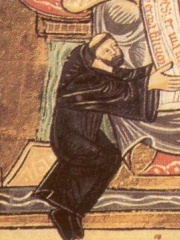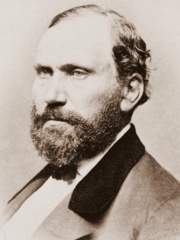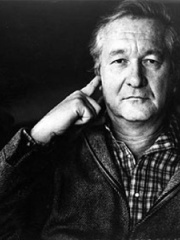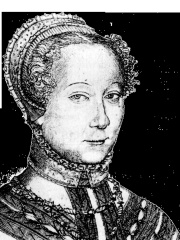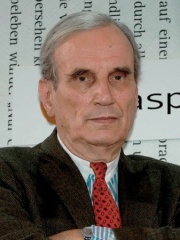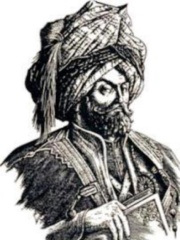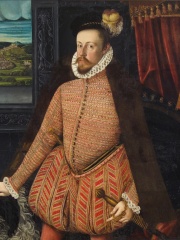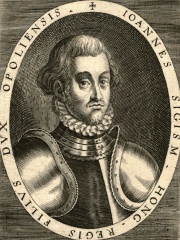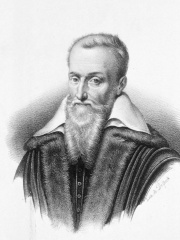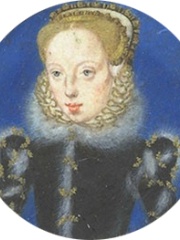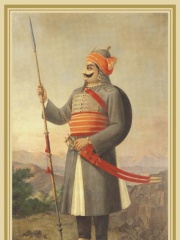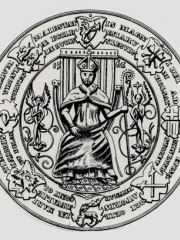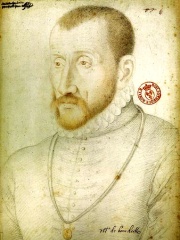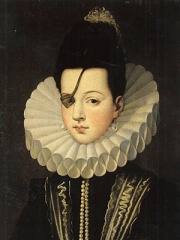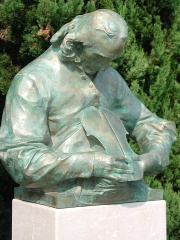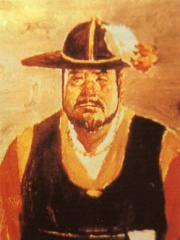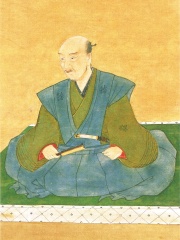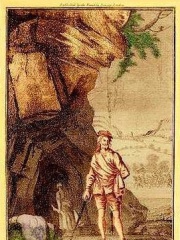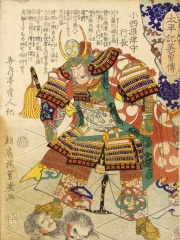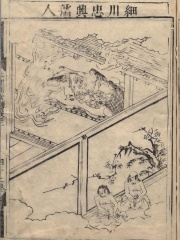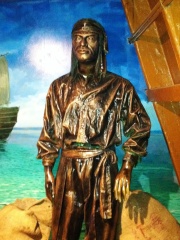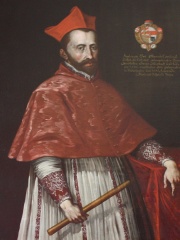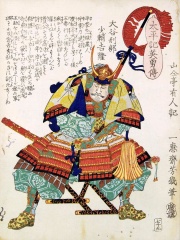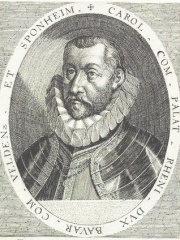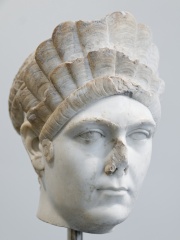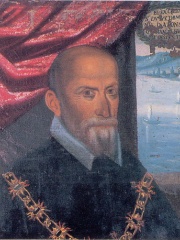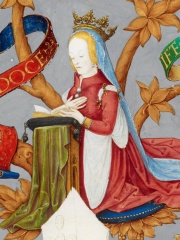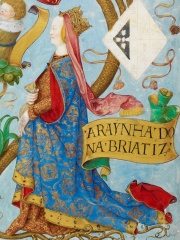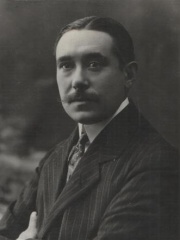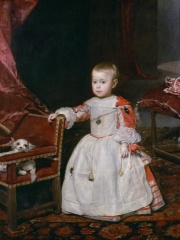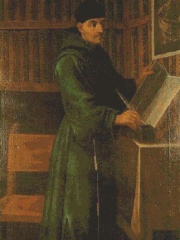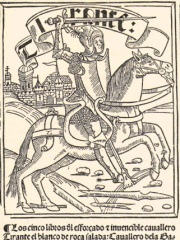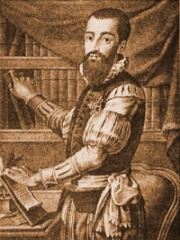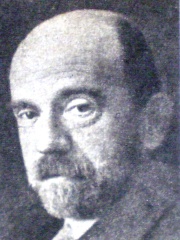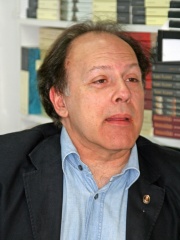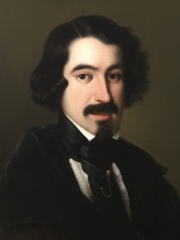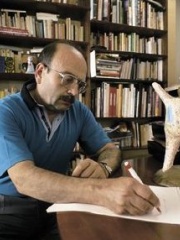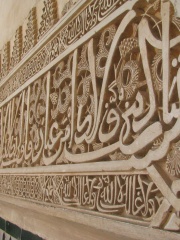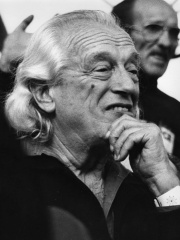WRITER
José de Acosta
1540 - 1600

 José de Acosta
José de Acosta
José de Acosta, SJ (1539 or 1540 in Medina del Campo, Spain – February 15, 1600 in Salamanca, Spain) was a sixteenth-century Spanish Jesuit missionary and naturalist in Latin America. His deductions regarding the ill effects of crossing over the Andes in 1570 related to the atmosphere being too thin for human needs led to the modern understanding of a variety of altitude sickness, now referred to as Acosta's disease. Read more on Wikipedia
His biography is available in 24 different languages on Wikipedia (up from 23 in 2024). José de Acosta is the 1,421st most popular writer (up from 1,545th in 2024), the 478th most popular biography from Spain (up from 542nd in 2019) and the 44th most popular Spanish Writer.
Memorability Metrics
Page views of José de Acosta by language
Among WRITERS
Among writers, José de Acosta ranks 1,421 out of 7,302. Before him are Roger Caillois, Fulcher of Chartres, A. E. van Vogt, Odo of Cluny, Allan Pinkerton, and William Styron. After him are Louise Labé, Liu Cixin, Joachim Fest, Sharafkhan Bidlisi, Callinus, and Poul Anderson.
Most Popular Writers in Wikipedia
Go to all RankingsRoger Caillois
1913 - 1978
HPI: 65.70
Rank: 1,415
Fulcher of Chartres
1059 - 1127
HPI: 65.70
Rank: 1,416
A. E. van Vogt
1912 - 2000
HPI: 65.70
Rank: 1,417
Odo of Cluny
878 - 942
HPI: 65.70
Rank: 1,418
Allan Pinkerton
1819 - 1884
HPI: 65.70
Rank: 1,419
William Styron
1925 - 2006
HPI: 65.68
Rank: 1,420
José de Acosta
1540 - 1600
HPI: 65.66
Rank: 1,421
Louise Labé
1524 - 1566
HPI: 65.66
Rank: 1,422
Liu Cixin
1963 - Present
HPI: 65.66
Rank: 1,423
Joachim Fest
1926 - 2006
HPI: 65.66
Rank: 1,424
Sharafkhan Bidlisi
1543 - 1603
HPI: 65.66
Rank: 1,425
Callinus
680 BC - 700 BC
HPI: 65.65
Rank: 1,426
Poul Anderson
1926 - 2001
HPI: 65.65
Rank: 1,427
Contemporaries
Among people born in 1540, José de Acosta ranks 10. Before him are Charles II, Archduke of Austria, John Sigismund Zápolya, Joseph Justus Scaliger, Lady Katherine Grey, Maharana Pratap, and Hümaşah Sultan. After him are Magnus, Duke of Holstein, Pierre de Bourdeille, seigneur de Brantôme, Paschal Baylón, Ana de Mendoza, Princess of Eboli, Gasparo da Salò, and Won Gyun. Among people deceased in 1600, José de Acosta ranks 7. Before him are Giordano Bruno, Ishida Mitsunari, Sawney Bean, Catharina van Hemessen, Konishi Yukinaga, and Hosokawa Gracia. After him are Luis de Molina, Enrique of Malacca, Gaspar de Lemos, Margrave Andrew of Burgau, Ōtani Yoshitsugu, and Charles I, Count Palatine of Zweibrücken-Birkenfeld.
Others Born in 1540
Go to all RankingsCharles II, Archduke of Austria
POLITICIAN
1540 - 1590
HPI: 74.23
Rank: 4
John Sigismund Zápolya
POLITICIAN
1540 - 1571
HPI: 73.33
Rank: 5
Joseph Justus Scaliger
HISTORIAN
1540 - 1609
HPI: 70.98
Rank: 6
Lady Katherine Grey
NOBLEMAN
1540 - 1568
HPI: 70.25
Rank: 7
Maharana Pratap
POLITICIAN
1540 - 1597
HPI: 69.78
Rank: 8
Hümaşah Sultan
COMPANION
1540 - 1592
HPI: 67.77
Rank: 9
José de Acosta
WRITER
1540 - 1600
HPI: 65.66
Rank: 10
Magnus, Duke of Holstein
POLITICIAN
1540 - 1583
HPI: 65.32
Rank: 11
Pierre de Bourdeille, seigneur de Brantôme
HISTORIAN
1540 - 1614
HPI: 64.19
Rank: 12
Paschal Baylón
RELIGIOUS FIGURE
1540 - 1592
HPI: 63.59
Rank: 13
Ana de Mendoza, Princess of Eboli
NOBLEMAN
1540 - 1592
HPI: 63.37
Rank: 14
Gasparo da Salò
POLITICIAN
1540 - 1609
HPI: 63.36
Rank: 15
Won Gyun
MILITARY PERSONNEL
1540 - 1597
HPI: 62.74
Rank: 16
Others Deceased in 1600
Go to all RankingsGiordano Bruno
ASTRONOMER
1548 - 1600
HPI: 88.57
Rank: 1
Ishida Mitsunari
MILITARY PERSONNEL
1559 - 1600
HPI: 71.42
Rank: 2
Sawney Bean
EXTREMIST
1600 - 1600
HPI: 68.72
Rank: 3
Catharina van Hemessen
PAINTER
1528 - 1600
HPI: 68.47
Rank: 4
Konishi Yukinaga
POLITICIAN
1555 - 1600
HPI: 67.06
Rank: 5
Hosokawa Gracia
POLITICIAN
1563 - 1600
HPI: 66.93
Rank: 6
José de Acosta
WRITER
1540 - 1600
HPI: 65.66
Rank: 7
Luis de Molina
PHILOSOPHER
1535 - 1600
HPI: 65.49
Rank: 8
Enrique of Malacca
EXPLORER
1495 - 1600
HPI: 64.57
Rank: 9
Gaspar de Lemos
EXPLORER
1500 - 1600
HPI: 63.89
Rank: 10
Margrave Andrew of Burgau
POLITICIAN
1558 - 1600
HPI: 63.26
Rank: 11
Ōtani Yoshitsugu
MILITARY PERSONNEL
1559 - 1600
HPI: 62.92
Rank: 12
Charles I, Count Palatine of Zweibrücken-Birkenfeld
NOBLEMAN
1560 - 1600
HPI: 62.34
Rank: 13
In Spain
Among people born in Spain, José de Acosta ranks 478 out of 3,355. Before him are María de las Mercedes, Princess of Asturias (1880), Ulpia Marciana (48), Alonso Pérez de Guzmán y Sotomayor, 7th Duke of Medina Sidonia (1550), Dulce of Aragon (1160), Josep Maria Bartomeu (1963), and Beatrice of Castile (1242). After him are Pepe Reina (1982), Joaquín Turina (1882), José Villalonga (1919), Philip Prospero, Prince of Asturias (1657), Jabir ibn Aflah (1100), and Samuel ibn Naghrillah (993).
Others born in Spain
Go to all RankingsMaría de las Mercedes, Princess of Asturias
POLITICIAN
1880 - 1904
HPI: 65.73
Rank: 472
Ulpia Marciana
POLITICIAN
48 - 112
HPI: 65.72
Rank: 473
Alonso Pérez de Guzmán y Sotomayor, 7th Duke of Medina Sidonia
MILITARY PERSONNEL
1550 - 1615
HPI: 65.70
Rank: 474
Dulce of Aragon
COMPANION
1160 - 1198
HPI: 65.70
Rank: 475
Josep Maria Bartomeu
BUSINESSPERSON
1963 - Present
HPI: 65.69
Rank: 476
Beatrice of Castile
COMPANION
1242 - 1303
HPI: 65.66
Rank: 477
José de Acosta
WRITER
1540 - 1600
HPI: 65.66
Rank: 478
Pepe Reina
SOCCER PLAYER
1982 - Present
HPI: 65.65
Rank: 479
Joaquín Turina
COMPOSER
1882 - 1949
HPI: 65.65
Rank: 480
José Villalonga
COACH
1919 - 1973
HPI: 65.65
Rank: 481
Philip Prospero, Prince of Asturias
POLITICIAN
1657 - 1661
HPI: 65.62
Rank: 482
Jabir ibn Aflah
MATHEMATICIAN
1100 - 1150
HPI: 65.61
Rank: 483
Samuel ibn Naghrillah
WRITER
993 - 1055
HPI: 65.61
Rank: 484
Among WRITERS In Spain
Among writers born in Spain, José de Acosta ranks 44. Before him are Bernardino de Sahagún (1499), Joanot Martorell (1415), Ruy González de Clavijo (1400), Ibrahim ibn Yaqub (912), Garcilaso de la Vega (1501), and Pío Baroja (1872). After him are Samuel ibn Naghrillah (993), Javier Marías (1951), José de Espronceda (1808), Manuel Vázquez Montalbán (1939), Ibn al-Khatib (1313), and Rafael Alberti (1902).
Bernardino de Sahagún
1499 - 1590
HPI: 67.01
Rank: 38
Joanot Martorell
1415 - 1465
HPI: 67.01
Rank: 39
Ruy González de Clavijo
1400 - 1412
HPI: 66.30
Rank: 40
Ibrahim ibn Yaqub
912 - 966
HPI: 66.01
Rank: 41
Garcilaso de la Vega
1501 - 1536
HPI: 65.96
Rank: 42
Pío Baroja
1872 - 1956
HPI: 65.89
Rank: 43
José de Acosta
1540 - 1600
HPI: 65.66
Rank: 44
Samuel ibn Naghrillah
993 - 1055
HPI: 65.61
Rank: 45
Javier Marías
1951 - 2022
HPI: 65.56
Rank: 46
José de Espronceda
1808 - 1842
HPI: 65.53
Rank: 47
Manuel Vázquez Montalbán
1939 - 2003
HPI: 65.51
Rank: 48
Ibn al-Khatib
1313 - 1374
HPI: 65.27
Rank: 49
Rafael Alberti
1902 - 1999
HPI: 65.21
Rank: 50



